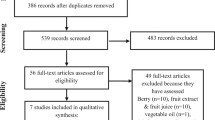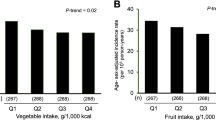Abstract
Background
Regular consumption of fruit and vegetables has been considered to be associated with a reduced risk of dementia and age-associated cognitive decline, although the association is currently unsupported by a systematic review of the literature.
Methods
We searched Medline, Embase, Biosis, ALOIS, the Cochrane library, different publisher databases as well as bibliographies of retrieved articles. All cohort studies with a follow-up of 6 months or longer were included if they reported an association of Alzheimer’s disease or cognitive decline in regard to the frequency of fruit and vegetables consumption.
Findings
Nine studies with a total of 44 004 participants met the inclusion criteria. Six studies analyzed fruit and vegetables separately and five of them found that higher consumption of vegetables, but not fruit is associated with a decreased risk of dementia or cognitive decline. The same association was found by three further studies for fruit and vegetable consumption analytically combined.
Conclusion
Increased intake of vegetables is associated with a lower risk of dementia and slower rates of cognitive decline in older age. Yet, evidence that this association is also valid for high fruit consumption is lacking.
Similar content being viewed by others
References
World Health Organization. Report of a WHO Study Group. Diet, Nutrition, and the Prevention of Chronic Diseases. WHO, editor. Geneva, Switzerland 1990.
He FJ, Nowson CA, MacGregor GA. Fruit and vegetable consumption and stroke: meta-analysis of cohort studies. Lancet. 2006;367(9507):320–326.
Dauchet L, Amouyel P, Hercberg S, Dallongeville J. Fruit and vegetable consumption and risk of coronary heart disease: a meta-analysis of cohort studies. J Nutr. 2006;136(10):2588–2593.
Boffetta P, Couto E, Wichmann J, et al. Fruit and vegetable intake and overall cancer risk in the European Prospective Investigation into Cancer and Nutrition (EPIC). I Natl Cancer Inst. 2010; 102(8):529–537.
Lampe JW. Health effects of vegetables and fruit: assessing mechanisms of action in human experimental studies. Am J Clin Nutr. 1999;70(3):475S–490S.
Liu RH. Health benefits of fruit and vegetables are from additive and synergistic combinations of phytochemicals. Am J Clin Nutr. 2003;78(3):517S–520S.
Eertmans A, Baeyens F, Van den Bergh O. Food likes and their relative importance in human eating behavior: review and preliminary suggestions for health promotion. Health Educ Res. 2001;16(4):443–456.
Alzheimer’s disease international. World Alzheimer Report. 2009 [cited 2010 01.09.2010]; Available from: http://www.alz.co.uk/research/files/WorldAlzheimerReporLpdf.
Stroup DF, Berlin JA, Morton SC. Meta-analysis of Observational Studies in. JAMA. 2000;283(15):2008–2012.
Ritchie K, Carrière I, Ritchie CW, Berr C, Artero S, Ancelin ML. Designing prevention programmes to reduce incidence of dementia: prospective cohort study of modifiable risk factors. Br Med J. 2010;341:c3885.
Morris MC, Evans DA, Tangney CC, Bienias JL, Wilson RS. Associations of vegetable and fruit consumption with age-related cognitive change. Neurology. 2006;67(8):1370–1376.
Kang JH, Ascherio A, Grodstein F Fruit and vegetable consumption and cognitive decline in aging women. Ann Neurol. 2005;57(5):713–720.
Barberger-Gateau P, Raffaitin C, Letenneur L, et al. Dietary patterns and risk of dementia: the Three-City cohort study. Neurology. 2007;69(20): 1921–1930.
Roberts RO, Geda YE, Cerhan JR, et al. Vegetables, Unsaturated Fats, Moderate Alcohol Intake, and Mild Cognitive Impairment. Dementia and Geriatric Cognitive Disorders. 2010;29(5):413–423.
Engelhart MJ, Ruitenberg A, Swieten JC, Witteman JC, Hofman A, Breteler MM. Dietary anti-oxidants and the risk of dementia. The Rotterdam study. Neurobiol Aging. 2000;21:203 Abstract.
Vercambre MN, Boutron-Ruault MC, Ritchie K, Clavel-Chapelon F, Berr C. Long-term association of food and nutrient intakes with cognitive and functional decline: a 13-year follow-up study of elderly French women. Br J Nutr. 2009; 102(03):419–427.
Nooyens AC, Bueno-de-Mesquita HB, van Boxtel MP, van Gelder BM, Verhagen H, Monique Verschuren WM. Fruit and vegetable intake and cognitive decline in middle-aged men and women: the Doetinchem Cohort Study. Br J Nutr. 2011 Apr 11;11:1–10.
Hughes TF, Andel R, Small BJ, et al. Midlife fruit and vegetable consumption and risk of dementia in later life in Swedish twins. Am J Geriatr Psychiatry. 2010 May;18(5):413–420.
Houston DK, Johnson MA, Daniel TD, Poon LW. Health and dietary characteristics of supplement users in an elderly population. Int J Vitam Nutr Res. 1997;67(3):183–191.
Commenges D, Scotet V, Renaud S, Jacqmin-Gadda H, Barberger-Gateau P, Dartigues JF. Intake of flavonoids and risk of dementia. Eur J Epidemiol. 2000; 16(4):357–363.
Letenneur L, Proust-Lima C, Le Gouge A, Dartigues JF, Barberger-Gateau P. Flavonoid intake and cognitive decline over a 10-year period. Am J Epidemiol. 2007; 165(12):1364–1371.
Morris MC, Evans DA, Bienias JL, et al. Dietary intake of antioxidant nutrients and the risk of incident Alzheimer disease in a biracial community study. JAMA. 2002;287(24):3230–3237.
Morris MC, Evans DA, Tangney CC, et al. Relation of the tocopherol forms to incident Alzheimer disease and to cognitive change. Am J Clin Nutr. 2005;81(2):508–514.
Engelhart MJ, Geerlings MI, Ruitenberg A, et al. Dietary intake of antioxidants and risk of Alzheimer disease. JAMA. 2002;287(24):3223–3229.
Laurin D, Masaki KH, Foley DJ, White LR, Launer LJ. Midlife dietary intake of antioxidants and risk of late-life incident dementia: the Honolulu-Asia Aging Study. Am J Epidemiol. 2004; 159(10):959–967.
Luchsinger JA, Tang MX, Shea S, Mayeux R. Antioxidant vitamin intake and risk of Alzheimer disease. Arch Neurol. 2003;60(2):203–208.
Dévore E, Grodstein F, van Rooij F, et al. Dietary antioxidants and long-term risk of dementia. Arch Neurol. 2010;67(7):819–825.
Gu Y, Nieves JW, Stern Y, Luchsinger JA, Scarmeas N. Food Combination and Alzheimer Disease Risk. Arch Neurol. 2010;67(6):699–706.
Scarmeas N, Stem Y, Tang MX, Mayeux R, Luchsinger JA. Mediterranean diet and risk for Alzheimer’s disease. Ann Neurol. 2006;59(6):912–921.
Scarmeas N, Stem Y, Mayeux R, Manly JJ, Schupf N, Luchsinger JA. Mediterranean diet and mild cognitive impairment. Arch Neurol. 2009;66(2):216–225.
Feart C, Samieri C, Rondeau V, et al. Adherence to a Mediterranean diet, cognitive decline, and risk of dementia. JAMA. 2009;302(6):638–648.
Markesbery WR, Carney JM. Oxidative alterations in Alzheimer’s disease. Brain Pathol. 1999;9(1): 133–146.
Vatassery GT. Vitamin E and other endogenous antioxidants in the central nervous system. Geriatrics. 1998;53:S25–S27.
Morris MC, Evans DA, Bienias JL, Tangney CC, Wilson RS. Vitamin E and cognitive decline in older persons. Arch Neurol. 2002;59(7): 1125–1132.
United States Departement of Agriculture. USDA National Nutrient Database for Standard Reference, Release 22. 2010 [cited 2011 06.04.2011]; Available from: http://www.ars.usda.gov/Services/docs.htm?docid=18877.
Isaac MG, Quinn R, Tabet N. Vitamin E for Alzheimer’s disease and mild cognitive impairment. Cochrane database of systematic reviews (Online). 2008 (3):CD002854.
Carr AC, Zhu BZ, Frei B. Potential antiatherogenic mechanisms of ascorbate (vitamin C) and {alpha}-tocopherol (vitamin E). Circ Res. 2000;87(5):349–354.
Fotuhi M, Mohassel P, Yaffe K. Fish consumption, long-chain omega-3 fatty acids and risk of cognitive decline or Alzheimer disease: a complex association. Nat Clin Pract Neurol. 2009 Mar;5(3):140–152.
Author information
Authors and Affiliations
Corresponding author
Rights and permissions
About this article
Cite this article
Loef, M., Walach, H. Fruit, vegetables and prevention of cognitive decline or dementia: A systematic review of cohort studies. J Nutr Health Aging 16, 626–630 (2012). https://doi.org/10.1007/s12603-012-0097-x
Received:
Accepted:
Published:
Issue Date:
DOI: https://doi.org/10.1007/s12603-012-0097-x




